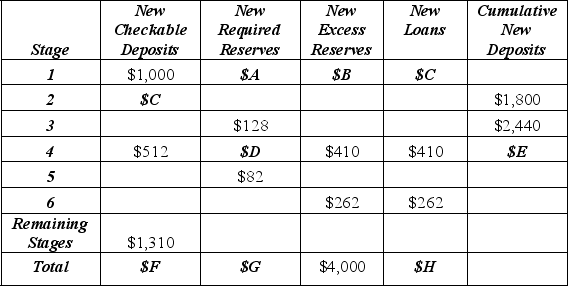Exam 9: The Nature and Creation of Money
Exam 1: Economics: the Study of Choice136 Questions
Exam 2: Confronting Scarcity: Choices in Production189 Questions
Exam 3: Demand and Supply243 Questions
Exam 4: Applications of Supply and Demand104 Questions
Exam 5: Macroeconomics: the Big Picture141 Questions
Exam 6: Measuring Total Output and Income156 Questions
Exam 7: Aggregate Demand and Aggregate Supply162 Questions
Exam 8: Economic Growth131 Questions
Exam 9: The Nature and Creation of Money219 Questions
Exam 10: Financial Markets and the Economy169 Questions
Exam 11: Monetary Policy and the Fed173 Questions
Exam 12: Government and Fiscal Policy170 Questions
Exam 13: Consumption and the Aggregate Expenditures Model214 Questions
Exam 14: Investment and Economic Activity135 Questions
Exam 15: Net Exports and International Finance194 Questions
Exam 16: Inflation and Unemployment128 Questions
Exam 17: A Brief History of Macroeconomic Thought and Policy120 Questions
Exam 18: Inequality, Poverty, and Discrimination135 Questions
Select questions type
The Federal Reserve buys $10,000 of government securities from commercial banks.If the required reserve ratio is 25%, what is the maximum amount of change in the nation's money supply? Assume that no banks keep excess reserves and no individuals or firms hold cash.
(Multiple Choice)
5.0/5  (38)
(38)
The money supply is the total amount of checkable deposits in the economy.
(True/False)
4.8/5  (46)
(46)
Suppose a bank has $50,000 in deposits and $6,000 in reserves.The required reserve ratio is 10%.Which of the following occurs if the required reserve ratio is increased to 12%?
(Multiple Choice)
4.8/5  (42)
(42)
Use the following to answer questions
Exhibit: Fed Buys Bonds
Scenario 1: Fed Buys Bonds from Sheila Jones
Consider a banking system in which the reserve requirement is 10%, banks try not to hold excess reserves, consumers and firms hold money only in the form of checking account balances, and all loan proceeds are spent.Suppose initially all banks in the system are loaned up.Now, suppose that the Fed buys a $100,000 bond from Sheila Jones, who banks at the Perez Bank, and that she deposits her check in her checking account at Perez Bank.
-(Exhibit: Fed Buys Bonds)
Which of the following happens when Sheila Jones deposits the proceeds from the sale of her bond to the Fed into her checking account at the Perez Bank?
(Multiple Choice)
4.7/5  (45)
(45)
Use the following to answer questions
Exhibit: Reserves, Loans, and Money
 -(Exhibit: Reserves, Loans, and Money)
The required reserve ratio is 10%.What is the amount of Bolton Bank's excess reserves?
-(Exhibit: Reserves, Loans, and Money)
The required reserve ratio is 10%.What is the amount of Bolton Bank's excess reserves?
(Multiple Choice)
4.8/5  (29)
(29)
Use the following to answer questions
Exhibit: Fed Sells Bonds
Scenario 2: Fed sells bonds to Henry Hyde
Consider a banking system in which the reserve requirement is 10%, banks try not to hold excess reserves, consumers and firms hold money only in the form of checking account balances, and all loan proceeds are spent.Suppose initially all banks in the system are loaned up.Now, suppose that the Fed sells a $50,000 bond to Henry Hyde, who pays for the bond by writing a check drawn against Jekyll Bank.
-(Exhibit: Fed Sells Bonds)
As a result of the open market sale, Jekyll Bank
(Multiple Choice)
4.9/5  (27)
(27)
You spend $20 to buy a used textbook at the college bookstore.What function does money perform here?
(Multiple Choice)
4.9/5  (33)
(33)
Money that some authority, generally a government, has ordered to be accepted as a medium of exchange is called _______ money.
(Multiple Choice)
4.8/5  (33)
(33)
Which of the following is not a function of the Federal Reserve System?
(Multiple Choice)
4.9/5  (44)
(44)
Which of the following items serve as a medium of exchange in the United States?
I.$100 cash
II.50 euros
III.the balance in your checking account
IV.a $1,000 corporate stock that you own
(Multiple Choice)
4.9/5  (28)
(28)
Which of the following is an example of a bank's liabilities?
(Multiple Choice)
4.9/5  (32)
(32)
A system in which banks hold reserves whose value is less than the sum of claims on those reserves is called
(Multiple Choice)
4.8/5  (42)
(42)
Use the following to answer questions
Exhibit: Deposit Expansion Stages
 -(Exhibit: Deposit Expansion Stages)
What is the value of $H (the total loans)
?
-(Exhibit: Deposit Expansion Stages)
What is the value of $H (the total loans)
?
(Multiple Choice)
4.9/5  (44)
(44)
The quantity of reserves that banks must hold against deposits is called
(Multiple Choice)
4.9/5  (36)
(36)
Showing 181 - 200 of 219
Filters
- Essay(0)
- Multiple Choice(0)
- Short Answer(0)
- True False(0)
- Matching(0)